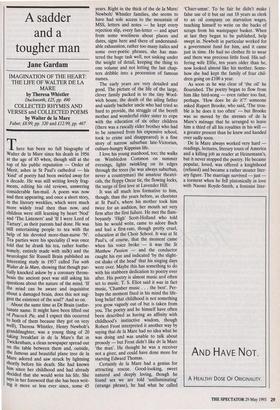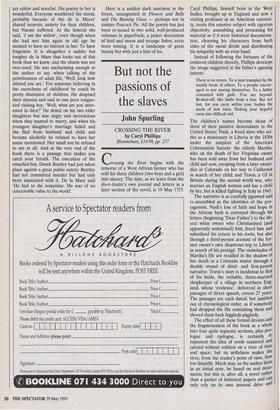A sadder and a tougher man
Jane Gardam
IMAGINATION OF THE HEART: THE LIFE OF WALTER DE LA MARE by Theresa Whistler Duckworth, f25, pp. 490 COLLECTED RHYMES AND VERSES and COLLECLED POEMS by Walter de la Mare Faber, £8.99, pp. 320 and f12.99, pp. 467 There has been no full biography of Walter de la Mare since his death in 1956 at the age of 83 when, though still at the top of his public reputation — Order of Merit, ashes in St Paul's cathedral — his `kind' of poetry had been swirled away for a decade. He was still writing lovely frag- ments, editing his old reviews, answering Considerable fan-mail. A poem was now and then appearing, and once a short story, in the literary weeklies, which were much more widely read then than now, and children were still learning by heart 'Nod' and 'The Listeners' and 'If I were Lord of Tartary', as their parents had done. He was still entertaining people to tea with the help of his devoted more-than-nurse 'N'. Tea parties were his speciality (I was once told that he drank his tea, rather loathe- somely, entirely made with milk) and the neurologist Sir Russell Brain published an interesting study in 1957 called Tea with Waiter de la Mare, showing that though par- tially knocked askew by a coronary throm- bosis the ancient poet was still asking his questions about the nature of the mind. `If the mind can be aware and inquisitive about a damaged brain, does this not sug- gest the existence of the soul?' And so on.
About the same time as Dr Brain (unfor- tunate name. It might have been lifted out of Peacock Pie, and I expect this occurred to both of them because they got on very well), Theresa Whistler, Henry Newbolt's granddaughter, was a young thing of 20 taking breakfast in de la Mare's flat in Twickenham, a clean newspaper spread out on the table between them and, outside, the famous and beautiful plane tree de la Mare adored and saw struck by lightning shortly before his death. She had known him since her childhood and had already decided that she would write his life. She Says in her foreword that she has been writ- ing it more or less ever since, some 45 years. Right in the thick of the de la Mare/ Newbolt/ Whistler families, she seems to have had sole access to the mountain of MSS, letters and notes — he kept every rejection slip, every fan-letter — and apart from some wooliness about places and dates, signs here and there of understand- able exhaustion, rather too many italics and some over-poetic phrases, she has mas- tered the huge task well, not sinking under the weight of detail, keeping the thing to one volume and not letting the last chap- ters dribble into a procession of famous names.
The early years are very detailed and good. The picture of the life of the large, clever family packed in to the tiny Wool- wich house, the death of the ailing father and saintly bachelor uncle who had tried so hard to provide, the struggle of the bereft mother and wonderful elder sister to cope with the education of six other children (there was a rascally elder brother who had to be removed from his expensive school, took to crime and disappeared) is a fine story of narrow suburban late-Victorian, culture-hungry Kippsian life.
I love his young manhood, too; the walks on Wimbledon Common on summer evenings, lights twinkling on its edges through the trees (he was always suburban, never a countryman) the amateur theatri- cals, the floppy Oscar tie, the flowing locks, the surge of first love at Lavender Hill. It was all much less formative to him, though, than the years before, as chorister at St Paul's, where his mother took him twice for an audition, her mouth set very firm after the first failure. He met the flam- boyantly 'High' Scott-Holland who told him he would write, came to adore Bach and had a first-rate, though pretty cruel, education at the Choir School. It was at St Paul's, of course, that the moment came when his voice broke — it was the St Matthew Passion — and the conductor caught his eye and indicated 'by the slight- est shake of the head' that his singing days were over. Maybe this has something to do with his stubborn dedication to poetry ever after. His poetry is almost music and often set to music. T. S. Eliot said it was in fact music, 'Chamber music . . . the best'. Per- haps the moment fixed in his mind the life- long belief that childhood is not something you grow vaguely out of but is taken from you. The poetry and he himself have often been described as having an affinity with childhood's instinctive wisdom, though Robert Frost interpreted it another way by saying that de la Mare had no idea what he was doing and was unable to talk about prosody — but Frost didn't like de la Mare `the man'. He thought he was a receiver not a giver, and could have done more for starving Edward Thomas. Certainly de la Mare had a genius for attracting rescue. Good-looking, sweet natured and deeply loving, though he found sex we are told 'unilluminating' (strange phrase), he had what he called ‘Charr-umm'. To be fair he didn't make false use of it but sat out 18 years as clerk to an oil company on starvation wages, teaching himself to write on the backs of scraps from his wastepaper basket. When at last they began to be published, help swept in. Newbolt in particular worked for a government fund for him, and it came just in time. He had no clothes fit to wear and there was precious little food. His suf- fering wife Ellie, ten years older than he, now looked almost like his mother. Some- how she had kept the family of four chil- dren going on f100 a year.
As soon as he was clear of 'the oil' he flourished. The poetry began to flow from him like bird-song — even rather too fast, perhaps. 'How does he do it'?' someone asked Rupert Brooke, who said, 'The trou- ble is he does it too often' — but Brooke was so moved by the stresses of de la Mare's ménage that he arranged to leave him a third of all his royalties in his will a greater present than he knew and handed over sadly soon.
De la Mare always worked very hard readings, lectures, literary tours of America and a killing job as reader at Heinemann's, but it never stopped the poetry. He became popular, loved, was offered a knighthood (refused) and became a rather stouter liter- ary figure. The marriage survived — just a torment when he fell platonically in love with Naomi Royde-Smith, a feminist liter- ary editor and novelist. His poetry to her is wonderful. Everyone weathered the storm, probably because of the de la Mares' shared neurotic anxiety for their children, but Naomi suffered. At the funeral she said, 'I am the widow', even though when she had met him again in old age he seemed to have no interest in her. To have forgotten. It is altogether a sadder but tougher de la Mare that looks out of this book than we knew, and the charm was not over-used. He was uncharming enough to the author to say, when talking of the pointlessness of adult life, 'Well, look how diluted you are.' For someone believing in the sacredness of childhood he could be pretty dismissive of children. He despised their shyness and said to one poor tongue- tied visiting boy, 'Well, what are you inter- ested in then?' He doted on his two elder daughters but was angry and incredulous when they wanted to marry, and when his youngest daughter's marriage failed and she fled from husband and child and became alcoholic he refused to have her name mentioned. Her small son he refused to see at all. And at the very end of the book there is a passage that makes you catch your breath. The execution of the retarded boy, Derek Bentley had just taken place against a great public outcry. Bentley had not committed murder but had only been associated with it. De la Mare said `He had to die sometime. He was of no conceivable value to the world'. Here is a sudden dark nastiness in the forest, unsuspected in Flowers and Bells and The Burning Glass — perhaps not in sinister Peacock Pie. All the poetry has just been re-issued in two solid, well-produced volumes in paperback, a jacket decoration of bird and moon and strange fishes, eerie trees tossing. It is a landscape of great beauty but with just a hint of ice.



















































 Previous page
Previous page